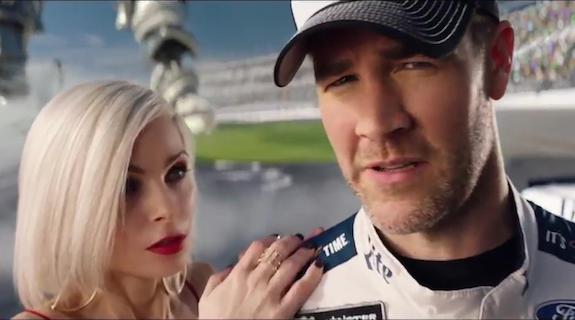Updated, Feb. 26, 2016, 9:06 a.m PT
Executives at Fox Sports may have been less than pleased with the headlines they saw earlier this week in one of the country’s most read newspapers, just days away from what is often called the Great American Race.
The Wall Street Journal, citing factors ranging from the economic difficulties of its working class fan base to the dearth of marketable stars currently in the sport, lays out a picture of a property in decline. NASCAR’s TV ratings provide evidence of a startling dip in popularity.
In 2006, more than 19 million people tuned in to watch Jimmie Johnson take the checkered flag at the Daytona 500. It was the highest-rated, most-viewed NASCAR race in history, pulling in an 11.3 rating on NBC and posting 4 percent gains in ratings, households and viewers from the year prior.
The next year, as part of a deal valued at close to $4.5 billion, Fox became the exclusive broadcaster of the Great American Race. Nobody knew it at the time, but that ‘06 race would be the apex of NASCAR’s popularity over the next decade.
A three-and-a-half million drop in viewers from 2008 to 2010 was disheartening enough, but in 2014 the bottom seemingly dropped out. The Daytona 500, which rebounded in 2013 to a five-year high of 16.7 million viewers, saw just 9.3 million in 2014, less than half the total audience from 2006.
Executives were willing to write it off as a one-time plunge since weather forced a rain delay of more than six hours. However, 2015’s 13.3 million was followed by just 11.4 million last year, the lowest rating ever, with the exception of 2014. The Daytona ratings are a reflection of NASCAR’s broader decrease, with ratings down 45 percent overall since 2005, according to Sports Business Journal.
Against that backdrop, Fox marketing executives have the formidable task of trying to grow viewership for a property that’s struggling and that they’re locked into for years to come (in 2013, Fox extended a deal that gives them television rights through 2024).
“What was really important for us this year with our strategy was not wanting to alienate the core [fans] but also to really broaden the audience,” says Nancy MacDonald, Fox Sports 1 VP of consumer marketing.
To that end, the network is rolling out a second year of its “Daytona Day” ad campaign (see above), leveraging some of Fox’s most popular assets to engage viewers with varying degrees of interest in NASCAR.
Fox has rolled out seven separate promotional spots meant to invoke the communal spirit of race day. One, directed by music video director Joseph Kahn, features James Vander Beek and aired during the fourth quarter of Super Bowl LI. The Simpsons pitched in a Daytona Day spot and super chef Gordon Ramsay developed recipes and menus for race day along with how-to videos.
FoxSports.com is housing a sweepstakes contest where fans pick the top-five finishers with the winner getting $50,000. Fox is also activating with partners like Pizza Hut, Smithfield, and UberEATS, with the latter providing discounts to people hosting Daytona Day parties. Fox is also in the process of rolling out 500 pieces of content between the Super Bowl and Daytona as part of its “Daytona 500 Hour Countdown.” The initiative is a larger rollout of the campaign Fox began last year.
“We really learned a lot in year one,” says MacDonald. “What we did last year was really gave a name to something that people were already doing…it’s really just about giving it a name and being able to encourage people all over the country that it’s a great day to get together, have fun and watch the race.”
NASCAR is doing its best to combat decreasing interest by making a series of rule changes, including a new scoring system that will break races up into three stages and award the top 10 drivers points at each stage. The changes coincide with a sponsorship change for the Cup series, now with Monster Energy coming in as title sponsor, a brand that seems to fit for a sport trying to gain traction with younger demographics.
TV executives believe basic awareness of the issues will help NASCAR begin to address them, with the rules changes being a start.
“[It’s] not a one year deal,” says MacDonald of the Daytona Day initiative, although she may as well be discussing the long-game NASCAR strategy Fox, for better or worse, is saddled with. “It’s really more of a marathon versus a sprint.”
Tags:













































__twocolumncontent.jpg)











